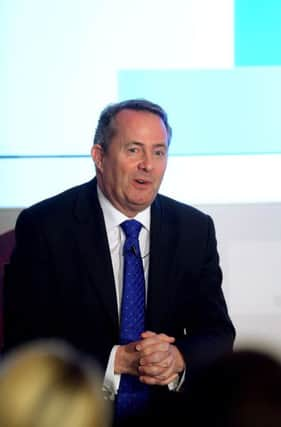Andrew Wilson: The hand on our shoulder as history is made


I learned in a voicemail from my dad as I sat on the Docklands Light Railway heading back home after a hard week of work. The commuters around me must have wondered why my eyes were soaked.
As life goes on, and our experiences shape us, these moments are increasingly telling and deep. I didn’t see Mary often, as is too often the case in the modern family. But through all of my adult life she has been a constant source of support and concern for me.
Advertisement
Hide AdAdvertisement
Hide AdWhenever I was hurt in work or at home, I could rely on a card popping through my letterbox with words of love, encouragement and always wisdom, deep wisdom. I have kept them all.
So my tears were not for her so much as for the loss of one more hand on my shoulder. For those of us lucky to have the support of close family and friends, the often relentless pressures of middle life can be made tolerable, liveable, possible.
Later that same day I was chairing a debate in Edinburgh between Liam Fox and George Robertson on the European referendum question. Two people with remarkably eminent public service careers debated the biggest question of the moment. From very different sides they produced the best debate on Europe I have yet heard.
A finely balanced question, where good people can disagree for good reasons and from the best of motivations. It was how the conduct of our public discourse should always be.
And the whole experience of that day leads me to make the core point I want to close my time as a Scotland on Sunday columnist with after three-and-a-half years. Life is hard enough, with the bit that we control – our own words and deeds – our duty is to be gentle on ourselves and on each other. The sum total of that approach to life makes the country a better place. The opposite, the opposite.
I do recognise that this is a simplistic point, but it remains my stand out reflection from the experience of my own life and from my thinking about the current affairs of Scotland each week on this page.
It has been a privilege for me to have this platform through a remarkable time in the story of our country and the wider world. So many big questions have been put and the answers remain in flux.
The world is presenting an epoch in the affairs of people that seems to me as fundamental and great as many of the geological or geographical moments that created the place we inhabit now.
Advertisement
Hide AdAdvertisement
Hide AdMaking sense of the meaning of it all, understanding “what the hell is going on”, knowing what to do in the face of seemingly gargantuan intractable problems. It overwhelms us.
In the face of migration, terrorism, rogue state nuclear arming, economic dislocation, gaping inequality, energy crises, war – always somewhere war – where do we look for guidance and hope?
The institutions we rely on are all under pressure and the model of how we run our world simply cannot survive as it is now. Whether that is the EU, the NHS, councils or our pensions.
But through it we will get and the sun will rise and the birds will sing.
We have got through much larger challenges in our past. My aunt Mary was born into a world where the 1,400-year caliphate of the Ottoman empire ended. Where Britain recognised the Soviet Union as Lenin died and Stalin’s murderous purges began. Fascists won two-thirds of the vote in Italy and the British Empire exhibition opened.
She got through all that. And another bloody war where air raid sirens punctuated the daily life of Glasgow, and her six-year-old sister, my mother, was evacuated to live with a family she didn’t know.
The big lesson we can learn, and we always have to relearn, is that whatever the chaos and noisy confusion of life, it shall go on. And how we behave as it does determines our own happiness and that of those we are privileged to be around.
Those who give their lives to serve us all and navigate our way through the landscape by leading our politics and institutions deserve our support and respect rather than our sneering cynicism. Check them of course, but recognise that the motivations are mostly pure.
Advertisement
Hide AdAdvertisement
Hide AdThrough all the dislocation ahead I know that the next generation will be a healthier, happier, better-adjusted bunch than mine. I know that we will find a way to fuel the world without destroying it. I know that we will find a way to secure our well-being in later life and to feed our planet sustainably. I know that our children will live longer, healthier, happier lives with a keener sense of purpose and spirituality than us.
But getting from here to there will involve pain for many of us. Which is why a hand on each other’s shoulder is worth so much. My manifesto for Scotland as we approach another election and referendum is this: understand more, condemn less.